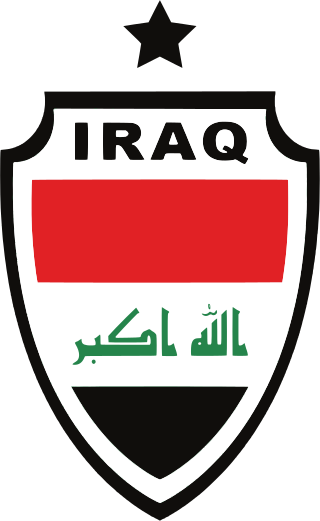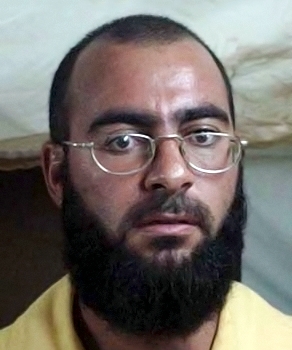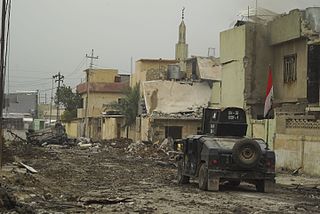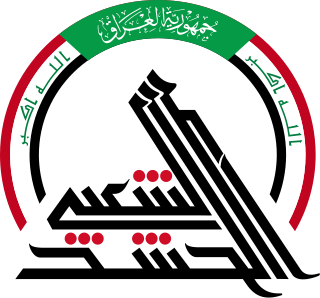
Baghdad is the capital and largest city of Iraq. Situated on the Tigris, it is part of the Baghdad Governorate and is located near the Diyala River. With a population variously estimated at 6 or over 7 million, Baghdad forms 22% of Iraq's total population. In comparison to its large population, the city has a small area at just 673 square kilometers. It is the second-largest city in the Arab world after Cairo, and the second-largest city in West Asia after Tehran. Baghdad is historically known as a global cultural hub.

The Iran–Iraq War, also known as the First Gulf War, was an armed conflict between Iran and Iraq that lasted from September 1980 to August 1988. Active hostilities began with the Iraqi invasion of Iran and lasted for nearly eight years, until the acceptance of United Nations Security Council Resolution 598 by both sides. Iraq's primary rationale for the attack against Iran cited the need to prevent Ruhollah Khomeini—who had spearheaded the Iranian Revolution in 1979—from exporting the new Iranian ideology to Iraq. There were also fears among the Iraqi leadership of Saddam Hussein that Iran, a theocratic state with a population predominantly composed of Shia Muslims, would exploit sectarian tensions in Iraq by rallying Iraq's Shia majority against the Baʽathist government, which was officially secular and dominated by Sunni Muslims. Iraq also wished to replace Iran as the power player in the Persian Gulf, which was not seen as an achievable objective prior to the Islamic Revolution because of Pahlavi Iran's economic and military superiority as well as its close relationships with the United States and Israel.

Saddam Hussein was an Iraqi politician and revolutionary who served as the fifth president of Iraq from 1979 to 2003. He also served as prime minister of Iraq from 1979 to 1991 and later from 1994 to 2003. He was a leading member of the revolutionary Arab Socialist Ba'ath Party and later its Iraqi regional branch. Ideologically, he espoused Ba'athism, a mix of Arab nationalism and Arab socialism, while the policies and political ideas he championed are collectively known as Saddamism.

The Gulf War was an armed conflict between Iraq and a 42-country coalition led by the United States. The coalition's efforts against Iraq were carried out in two key phases: Operation Desert Shield, which marked the military buildup from August 1990 to January 1991; and Operation Desert Storm, which began with the aerial bombing campaign against Iraq on 17 January 1991 and came to a close with the American-led liberation of Kuwait on 28 February 1991.

Estimates of the casualties from the Iraq War have come in several forms, and those estimates of different types of Iraq War casualties vary greatly.

The prime minister of the Republic of Iraq is the head of government of Iraq and the commander-in-chief of the Iraqi Armed Forces. On 27 October 2022, Mohammed Shia' Al Sudani became the incumbent prime minister.

Muqtada al-Sadr is an Iraqi Shia Muslim cleric, politician and militia leader. He inherited the leadership of the Sadrist Movement from his father. He founded the now dissolved Mahdi Army militia in 2003 that resisted the American occupation of Iraq. He also founded the Promised Day Brigade militia after the dissolution of the Mahdi Army; both were backed by Iran. In 2014, he founded the Peace Companies militia and is its current head. In 2018, he joined his Sadrist political party to the Saairun alliance, which won the highest number of seats in the 2018 and 2021 Iraqi parliamentary elections.

Jalal Talabani was an Kurdistanî politician who served as the sixth president of Iraq from 2005 to 2014, as well as the president of the Governing Council of Iraq. He was ethnically Kurdish.

The Iraq national football team represents Iraq in men's international football and is controlled by the Iraq Football Association (IFA), the governing body for football in Iraq. Iraq's usual home venue is the Basra International Stadium.

The Iraq War, also referred to as the Second Gulf War, was a prolonged conflict in Iraq lasting from 2003 to 2011. It began with the invasion by a United States-led coalition, which resulted in the overthrow of the Ba'athist government of Saddam Hussein. The conflict persisted as an insurgency arose against coalition forces and the newly established Iraqi government. US forces were officially withdrawn in 2011. In 2014, the US became re-engaged in Iraq, leading a new coalition under Combined Joint Task Force – Operation Inherent Resolve, as the conflict evolved into the ongoing insurgency.

Iraq, officially the Republic of Iraq, is a country in West Asia and a core country in the geopolitical region known as the Middle East. With a population exceeding 46 million, it is the 35th-most populous country. It consists of 18 governorates. The country is bordered by Turkey to the north, Saudi Arabia to the south, Iran to the east, the Persian Gulf and Kuwait to the southeast, Jordan to the southwest, and Syria to the west. The capital and largest city is Baghdad. Iraqi people are diverse; mostly Arabs, as well as Kurds, Turkmen, Yazidis, Assyrians, Armenians, Mandaeans, Persians and Shabakis with similarly diverse geography and wildlife. Most Iraqis are Muslims – minority faiths include Christianity, Yazidism, Zoroastrianism, Mandaeism, Yarsanism and Judaism. The official languages of Iraq are Arabic and Kurdish; others also recognized in specific regions are Turkish, Assyrian, and Armenian.

The Islamic State (IS), also known as the Islamic State of Iraq and the Levant (ISIL), the Islamic State of Iraq and Syria (ISIS), and by its Arabic acronym Daesh, is a transnational Salafi jihadist group and an unrecognised quasi-state.

Tanzim Qaidat al-Jihad fi Bilad al-Rafidayn, more commonly known as Al-Qaeda in Iraq, was a Salafi jihadist organization affiliated with Al-Qaeda. It was founded on 17 October 2004, and was led by Abu Musab al-Zarqawi until its disbandment on 15 October 2006 after he was killed in a targeted bombing on June 7, 2006 in Hibhib, Iraq by the United States Air Force.

Ibrahim Awad Ibrahim Ali al-Badri, commonly known by his nom de guerreAbu Bakr al-Baghdadi, was an Iraqi militant who was the first caliph of the Islamic State (IS) from 2014 until his death in 2019.

The War in Iraq (2013–2017) was an armed conflict between Iraq and its allies and the Islamic State. Following December 2013, the insurgency escalated into full-scale guerrilla warfare following clashes in the cities of Ramadi and Fallujah in parts of western Iraq, and culminated in the Islamic State offensive into Iraq in June 2014, which lead to the capture of the cities of Mosul, Tikrit and other cities in western and northern Iraq by the Islamic State. Between 4–9 June 2014, the city of Mosul was attacked and later fell; following this, Prime Minister Nuri al-Maliki called for a national state of emergency on 10 June. However, despite the security crisis, Iraq's parliament did not allow Maliki to declare a state of emergency; many legislators boycotted the session because they opposed expanding the prime minister's powers. Ali Ghaidan, a former military commander in Mosul, accused al-Maliki of being the one who issued the order to withdraw from the city of Mosul. At its height, ISIL held 56,000 square kilometers of Iraqi territory, containing 4.5 million citizens.

Many states began to intervene against the Islamic State, in both the Syrian Civil War and the War in Iraq (2013–2017), in response to its rapid territorial gains from its 2014 Northern Iraq offensives, universally condemned executions, human rights abuses and the fear of further spillovers of the Syrian Civil War. These efforts are called the war against the Islamic State, or the war against ISIS. In later years, there were also minor interventions by some states against IS-affiliated groups in Nigeria and Libya. All these efforts significantly degraded the Islamic State's capabilities by around 2019–2020. While moderate fighting continues in Syria, as of 2024, ISIS has been contained to a manageably small area and force capability.

Operation Inherent Resolve (OIR) is the United States military's operational name for the international war against the Islamic State, including both a campaign in Iraq and a campaign in Syria, with a closely related campaign in Libya. Through 18 September 2018, the U.S. Army's III Armored Corps was responsible for Combined Joint Task Force – Operation Inherent Resolve (CJTF—OIR) and were replaced by the XVIII Airborne Corps. The campaign is primarily waged by American and British forces in support of local allies, most prominently the Iraqi security forces and Syrian Democratic Forces (SDF). Combat ground troops, mostly special forces, infantry, and artillery have also been deployed, especially in Iraq. Of the airstrikes, 70% have been conducted by the military of the United States, 20% by the United Kingdom and the remaining 10% being carried out by France, Turkey, Canada, the Netherlands, Denmark, Belgium, Saudi Arabia, the United Arab Emirates, Australia and Jordan.

The Popular Mobilization Forces (PMF), also known as the Popular Mobilization Units (PMU), is an Iraqi state-sponsored paramilitary network composed of about 67 primarily Shi'ite armed factions but also include Sunni Muslim, Christian, and Yazidi groups. The PMF were formed in 2014 and fought in nearly every major battle during the War in Iraq (2013–17) against Islamic State. Many of its main militias that belong to the Shia faction, trace their origins to the "Special Groups", Iranian-sponsored Shi'ite groups that previously fought in the Iraqi insurgency against the United States and the Coalition forces, as well as a sectarian conflict against Sunni Jihadist and Ba'athist insurgents. It has been labeled the new Iraqi Republican Guard after it was fully reorganized in early 2018 by its then-Commander Haider al-Abadi, Prime Minister of Iraq from 2014 to 2018, who issued "regulations to adapt the situation of the Popular Mobilization fighters".

The Battle of Mosul was a major battle initiated by the Iraqi Government forces with allied forces, the Kurdistan Regional Government, and international forces to retake the city of Mosul from the Islamic State (ISIL), which had seized the city years prior in June 2014. It was the largest conventional land battle since the capture of Baghdad in 2003. It was also the world's single largest military operation overall since the 2003 invasion of Iraq and was considered the toughest urban battle since World War II.

The Islamic State insurgency in Iraq is an ongoing low-intensity insurgency that began in 2017 after the Islamic State (IS) lost its territorial control in the War in Iraq, during which IS and allied White Flags fought the Iraqi military and allied paramilitary forces.


















